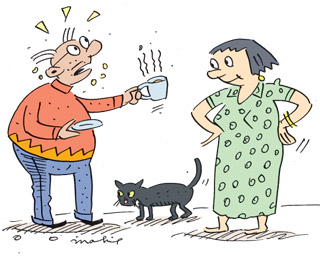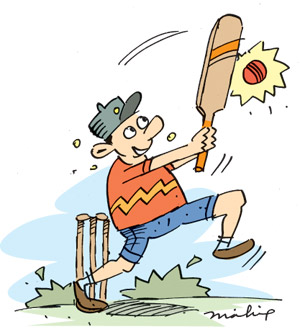|

by R. S. Karunaratne
The use of ‘too’
in speech and writing
As an adverb ‘too’ means ‘more than enough’.
It can also mean ‘in addition’ or ‘as well.’
|

The tea is too hot to drink. |
1. ‘Too’ is used to talk about things being excessive.
She is too old to apply for the post.
You are too late. The function has already started.
The tea is too hot to drink.
Narmada is too young to drive.
There are too many people on the beach.
2. ‘Too’ is used to talk about being excessive for a certain purpose.
She didn’t like the house because it is too far away from the town.
Jeeva sang too softly that I didn’t hear anything.
When you are too polite others might take it as timidity.
3. ‘Too’ is used to add something to what has already been said.
You too could have joined the trip if you had paid the money.
Most electrical appliances are useful and safe too.
A: I’d love to have a cup of coffee now.
B: Me too
4. ‘Too’ is followed by certain adjectives and adverbs.
It’s too early to go because the lecture starts at 10.30 am.
The questions were too easy and we passed the examination.
The log is too hard and he cannot split it.
|

There are too many trishaws
on the road. |
Are we too late to get a seat?
I know too little about this subject.
The distance was too long that we didn’t want to walk.
The seats were too low that we felt very uncomfortable.
You are too small to learn karate.
I didn’t like him because he was a bit too friendly.
There are too many trishaws on the road.
5. Set phrases
A: I didn’t get the job.
B: Too bad. (You feel sorry)
A: I’m sweating.
B: Me, too.
A: She is beautiful, educated and rich.
B: It’s too good to be true.
(You doubt it).
Confusable
words
Some words in English are confusable because they look or sound
similar. Sometimes they have similar but not identical meanings. Let’s
have a look at some of these words.
1.Ability and
capability
We often use ability to say that somebody can do something well.
Max Perera had remarkable ability as an English teacher.
A person’s capability is the amount of work he can do and how well he
can do it.
A film director knows the capability of his actors to do various
roles.
2. Above and
over
Both these words are used to talk about position and height.
The mahogany trees rose above the walauwa.
Sumithra hung a picture above the cupboard.
Our friendship lasted over a year.
3. Accuse and
charge
You can accuse somebody of doing something wrong.
The officer was accused of incompetence.
The police can charge somebody with committing a crime.
The arrested man was charged with murder.
4. Actual and
real.
We use actual to emphasise that the place, object, or person you are
talking about is the correct or genuine one.
We call him “Bug” but his actual name in Mason.
Something that is real exists and is not imagined.
I do not know whether her feelings were real or imaginary.
5. Admission and
admittance
When you want to get into a private building, you seek admission.
Admittance is a formal word sometimes used on signs: No admittance.
The stranger insisted on admission to the minister’s office.
If you see a ‘No admittance’ sign, do not enter that room.
6. Advise and
advice.
Advise is a verb. Advice is a noun.
You need to seek medical advice.
You can advise him to be more careful.
7. Affect and
effect
Affect is a verb. Effect is a noun.
Noise affects different people in different ways.
The medicine had no effect on the patient.
8. After and
behind
We use after to say that something happens at a later time than
something else.
He started reading after lunch.
If you are behind somebody or something, you are facing their back.
The girl walked behind her mother.
Starters :
Subject-verb agreement
Every sentence you write must have a subject and a verb. The subject
can be a noun or a pronoun. The verb usually states what the subject is
or what it does.
Mother cooks everyday.
Here 'mother' is the subject and 'cooks' is the verb.
He plays cricket every weekend.
|

He plays cricket every weekend |
Here 'He' is the subject and 'plays' is the verb.
We use singular verbs for singular subjects and plural verbs for
plural subjects.
My sister takes the bus to office.
(Singular subject + singular verb)
My sisters take the bus to office.
(Plural subject + plural verb)
This pen writes well.
(Singular subject + singular verb)
These pens write well.
(Plural subject + plural verb)
There are two types of verbs: main verbs and auxiliary or helping
verbs. The majority of verbs are main verbs. Auxiliary or helping verbs
belong to a small category. They include "be verbs, to do, to have, can,
may etc." They cannot, however, stand on their own.
She will pass the examination.
(Here 'will' is the auxiliary verb and 'pass' is the main verb.)
Some auxiliary verbs such as "to be, to do, and to have" can be used
as main verbs.
My aunt is a seamstress.
Here is is used as a main verb.
Exception to the general rule: The singular pronouns 'I' and 'you' do
not take singular verbs.
I write with a pen.
You play tennis every weekend.
Uncountable nouns take singular verb forms.
The rice is cooked in clay pots.
The news is exciting.
The water is boiling.
When two or more subjects are joined by and they take a plural verb.
Mary and Peter travel by train.
Mr. and Mrs. Perera are here to see you.
The editor and his staff are attending a meeting.
Shantha and Nishantha participate in indoor games.
Using 'has' and
'have'
For one person or thing use 'has'.
She has a dictionary.
The dog has a bushy tail.
The cat has nine lives.
The elephant has a long trunk.
Jim has a bad temper.
For more than one person or thing use 'have'
The children have bats and balls.
Elephants have long trunks.
Monkeys have long tails.
I have three pens.
You have a big dictionary.
Activity
Write has or have in the blanks.
Check your answers with the key.
1. Banda -- lost his library card.
2. Where -- you been all day?
3. I -- read this novel.
4. He -- damaged my book.
5. -- mother come home yet?
6. -- my sisters come home yet?
7. Both the dogs -- separate kennels.
8. The elephant -- a short tail.
9. She -- eaten all the icecream.
10. We -- a satellite television.
*******
[Key]
1 has, 2. have, 3. have, 4. has, 5. has, 6. have,
7. have, 8. has, 9 has, 10. have. |

